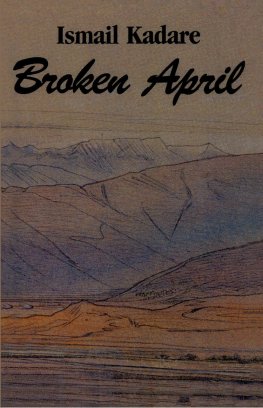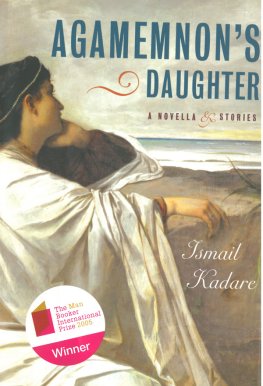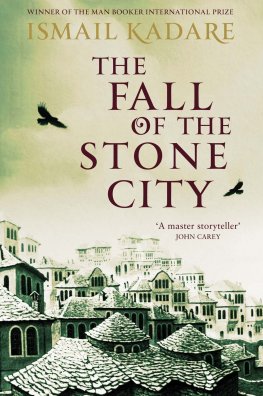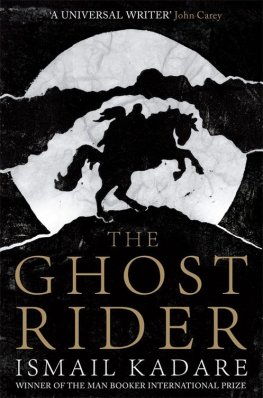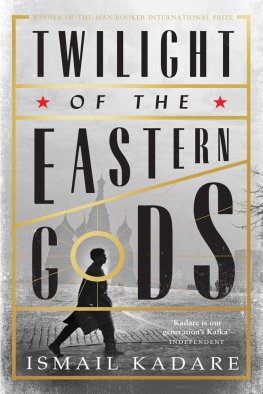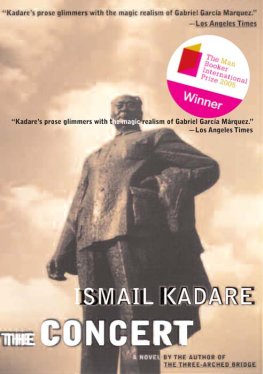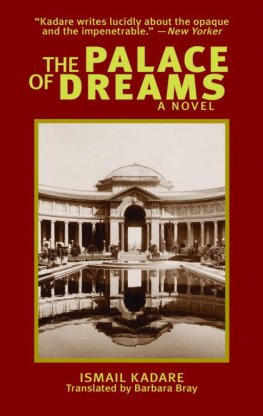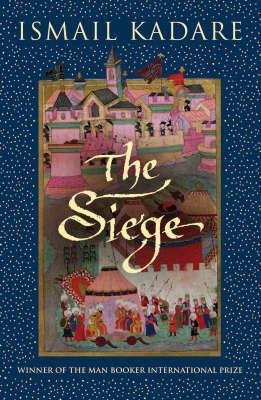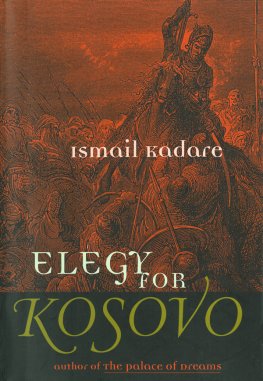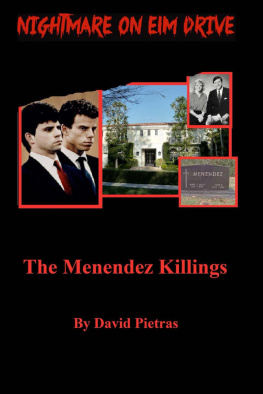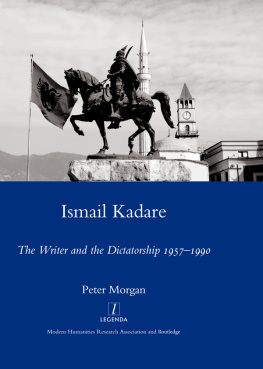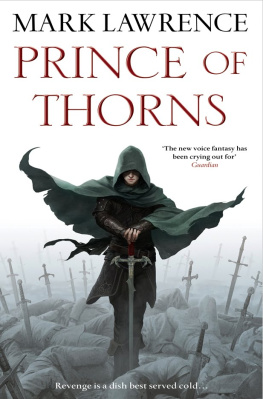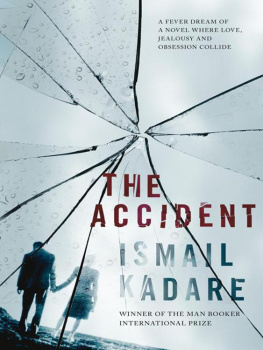Ismail Kadare
Broken April
The Albanian alphabet is phonetic; it sometimes uses two letters to indicate a single sound. Some Albanian letters have sound values that do not coincide with those of English. Among them are the following letters, which occur in proper names in Broken April:
Vowels
an unstressed vowel, like a in a lot
y
German u or the u of French rendu, attendu, etc.
Consonants
c
ts as in curtsy
ch as in church
dh
voiced th as in there
gj
g as in gem
j
y as in yellow
q
a sound approximating the shortened sound of tu as in future
His feet were cold, and each time he moved his numbed legs a little he heard the desolate grating of pebbles under his shoes. But the sense of desolation was really inside him. Never before had he stayed motionless for so long, lying in wait behind a ridge that overlooked the highway.
Daylight was fading. Fearful or simply troubled, he brought the rifles stock to his cheek. Soon it would be dusk, and he would not be able to see the sights of the weapon in the fading light. Hes sure to come by before its too dark to take aim, his father had said. Just be patient and wait.
Slowly the gun barrel swept over some patches of the half-thawed snow towards the wild pomegranates scattered through the brush-covered space on both sides of the road. For perhaps the hundredth time he thought that this was a fateful day in his life. Then the gun barrel swung back again to where it had been. What in his mind he had called a fateful day was no more than those patches of snow and those wild pomegranates that seemed to have been waiting since midday to see what he would do.
He thought, soon night will fall and it will be too dark to shoot. He wished that dusk would come swiftly, that night would race on after it, so that he could run away from this accursed ambush. It was the second time in his life that he had lain in wait to take revenge, but the man he must kill was the same one, so that this ambush was really an extension of the other.
He became aware again of his icy feet, and he moved his legs as if to keep the cold from rising in his body, but it had long since reached his belly, his chest and even his head. He had the feeling that bits of his brain had frozen, like those patches of snow along the sides of the road.
He felt that he could not shape a clear thought. He had only a vague animosity for the wild pomegranates and the patches of snow, and sometimes he told himself that were it not for them, he would have given up his vigil long ago. But there they were, motionless witnesses that had kept him from going away.
At the bend in the road, for perhaps the twentieth time that day, he thought he saw the man he had been waiting for. The man came on with short steps; the black barrel of his rifle rose above his right shoulder. The watcher started. This time it was no hallucination. It really was the man he was waiting for.
Just as he had done so many times before, Gjorg brought the rifle to his shoulder and took aim at the mans head. For a moment the head seemed to resist him, trying to elude his sights, and at the last instant he even thought he saw an ironic smile on the mans face. Six months before, the same thing had happened, and so as not to disfigure that face (who can say whence that touch of pity came at the last moment?) he had lowered the front sight of his weapon and wounded his enemy in the neck.
The man came closer. Please not a wound this time, Gjorg said to himself in a kind of prayer. His family had had great trouble paying the fine for the first wound, and a second fine would ruin them. But there was no penalty for death.
The man came closer. Gjorg thought, better a clean miss than a wound. As he had done each time he had imagined he saw the man, in keeping with the custom, he warned the man before he fired. Neither then nor later did he know if he had called aloud or if the words had been stifled in his throat. In fact the other man turned his head sharply. Gjorg saw him move his arm as if to unsling the rifle from his shoulder, and he fired. Then he raised his head, and as if bewildered watched the dead man still standing, but Gjorg was sure he had killed him take a step forward, drop his rifle on the right side, and immediately fall to the left.
Gjorg came out of concealment and walked towards the body. The road was deserted. The only sound was the sound of his own footsteps. The dead man had fallen in a heap. Gjorg bent down and laid his hand on the mans shoulder, as if to wake him. What am I doing? he said to himself. He gripped the dead mans shoulder again, as if he wanted to bring him back to life. Why am I doing this? he thought. At once he realized that he had bent down over the other man not to awaken him from eternal sleep but to turn him on his back. He simply meant to follow the custom. Around him patches of snow were still there, scattered witnesses.
He stood up and was about to leave when he remembered that he had to put the dead mans rifle near his head.
He did it all as if in a dream. He felt like vomiting, and he told himself several times that it must be because of the blood. A few moments later he was fleeing down the deserted road, almost at a run.
Dusk was falling. He looked back two or three times without knowing why. The road was still completely empty. In the dying day the still deserted road stretched away between brush and thicket.
Somewhere ahead he heard mule bells, then human voices, and he saw a group of people. In the twilight it was hard to tell whether they were visitors or mountain folk returning from the market. They came up with him sooner than he had expected. Men, young women, and children.
They said, Good evening, and he stopped. Even before he spoke, he motioned in the direction from which he had come. Then he said in a hoarse voice, Over there by the bend in the road I killed a man. Turn him on his back, good people, and put his rifle by his head.
The little group was still. Then a voice asked, Youre not blood-sick are you? He did not answer. The voice suggested a remedy, but he did not hear it. He had started walking again. Now that he had asked them to turn over the dead mans body as it should be, he felt relieved. He could not remember whether or not he had done that himself. The Kanun* provided for a state of shock on the part of the killer, and permitted passers-by to complete whatever he had not been able to do. In any case, to leave a dead man face-down, his weapon far off, was an unforgivable disgrace.
Night had not yet fallen when he reached the village. It was still his fateful day. The door of the kulla** was ajar. He pushed it open with his shoulder and went in.
Well? someone asked from inside.
He nodded.
When?
Just now.
He heard footsteps coming down the wooden stairs.
Theres blood on your hands, his father said. Go and wash them.
It must have happened when I turned him over.
He had tormented himself needlessly. A glance at his hands would have told him that he had done everything in keeping with the rules.
There was a smell of roasted coffee in the kulla. Astonishingly, he was sleepy. He yawned twice. The gleaming eyes of his little sister, who leaned against his left shoulder, seemed far away, like two stars beyond a hill.
And now? he said suddenly, to no one in particular.
We must tell the village about the death, his father answered. Only then did Gjorg notice that his father was putting on his shoes.
He was drinking coffee his mother had made for him when he heard, outside, the first shout:
Gjorg of the Berisha has shot Zef Kryeqyqe.

